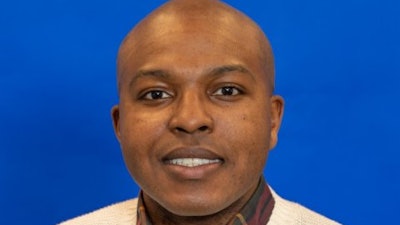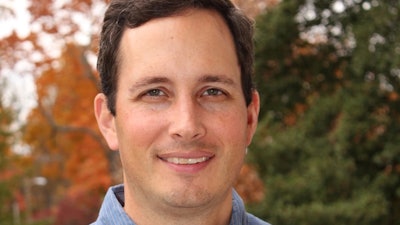Time-sensitive requests during off hours. Explanations with too much personal information. These are a few of the ways many college students communicate with their instructors over email, much to the dismay and frustration of many educators.
"I would have never sent 85% of the emails that I and other professors receive from students in terms of just misspellings, not articulating what the issue is, and the angry rant email,” says Dr. Marvin T. Chiles, an assistant professor of African American history at Old Dominion University. “We've all got them. If you have taught a college class for 15 minutes, you got an angry email from a student."
 Dr. Marvin T. Chiles
Dr. Marvin T. Chiles
“This presentation was designed in response to the growing popularity of email and the subsequent need for information on how to craft appropriate email messages,” a guide from Purdue University reads.
The posts feature various tips such as: checking for proper spelling, grammar, and punctuation; explaining prior attempts to solve the issue at hand; using correct titles for individuals; and keeping emails brief and to the point.
Informal language
“To stay updated on university-related matters, students should check their email frequently, ideally daily, but at a minimum, twice a week,” Dr. Stacey Patton, professor in Howard University’s media, journalism, film & communication department, wrote in an Aug. 9 Facebook post. “Effective and professional communication is expected from students. While emails might seem informal due to their speed and convenience, in academic and professional contexts, they should remain formal.”
What the advice boils down to is that emails students send to their instructors should carry a general air of propriety, professionalism, respect, and politeness – things that some educators say are increasingly lacking in this generation of college goers.
 Dr. Dan Florell
Dr. Dan Florell
Reasons behind the behavior
In their decade-old article, Wilson and Florell attributed this kind of impropriety to factors unique to email communication: the inability to give comments or nonverbal cues for a one-way message; lack of social interaction norms; and the immediacy with which an email can be sent in the heat of the moment.
“As instructors, we need to understand the role that asynchrony, depersonalization, and immediacy play in the content of our students’ e-mails,” the two wrote in the article.
In the article, they offer several ways that instructors can respond to such emails. Educators, they note, can establish explicit boundaries in their course syllabi. Formally teaching students on what is required in a professional email and being empathetic but firm are some of the other options.
The two wrote their article at a time when social networking was new, Florell says, and when direct messaging, social media, and other modern forms of communication weren’t used as frequently.
 Dr. Steffen Wilson
Dr. Steffen Wilson
More than 10 years later, the volume of these kinds of emails they receive has decreased to some degree, Wilson and Florell say.
"Some of the inappropriate content has actually decreased,” says Wilson, a professor in EKU’s department of psychology. “I think, as students [are] emailing their teachers and counselors in high school, so they're getting more education on how to email, I think I'm seeing less of that.
“I don't think that will ever completely go away. I still will occasionally get an email with a lot of personal information that really doesn't need to be shared with me or ... an advising appointment [with 'high importance']."
But Florell points out that the categories they established in their article regarding the varieties of student emails they get – ‘passing the buck,’ ‘blame the professor,’ ‘I want it now,’ and many more – have remained constant.
Contrary to Wilson, he suggests that, with the development of faster forms of online communication, exposure to formal emailing may have even decreased for today’s students. There is also more informality between students and teachers in grade school now than there was 50 years ago, he adds.
“I would say that, if anything, the idea of being professional in your communications is still somewhat of a foreign concept for students because I don't think they get exposed to it a lot,” says Florell, who specializes in school psychology and child and adolescent development. “I think it's still a struggle for them. We still see some of the very similar categories that we had even back then." Dr. Nicholas D. Hartlep
Dr. Nicholas D. Hartlep
In the early 2010s, the digital medium had “democratized” and taken away formality in many things, says Chiles, who adds that there may be a correlation between a lack of email etiquette and a “social media-fixation of young people.”
“The Gen Z population grew up with social media,” Chiles says. “My generation, we had MySpace, then Facebook. But we didn't grow up with social media. Social media came about when we were in high school and college.
“And so now, you have a lot of Gen Z college-age students who grew up with Twitter, TikTok, and other forms of social media. They grew up with it. And these are forums where you can literally express yourself in any way you see fit."
To them, emailing a professor may be more akin to making a social media post, he notes. From his perspective, the problem has only worsened over time.
“In their mind, to send a professor an angry email is just like sending out an angry Tweet into the ether,” he says. “It doesn't really matter. ... In their mind, if it's on a digital space, you talk to people any way you feel like talking to them."
Dr. Nicholas D. Hartlep, the Robert Charles Billings Endowed Chair in Education at Berea College, notes that he does not know whether, statistically speaking, there are significantly more bad etiquette emails being sent now than even five years ago.
Nonetheless, the effects of modern digital communication on people extend beyond the university setting as well, says Hartlep. He says the degree to which people use and are on their devices now affects the attention spans and thoughtfulness of people in general.
Student response
Sujana Sridhar, a rising third-year at UCLA and academic affairs commissioner for the school’s Undergraduate Students Association Council, says it's important to respect professors and their time and attributes the lack of email etiquette to a variety of reasons.
Sridhar says that students who hail from low-income households and underfunded school districts may not have had opportunities to learn how to craft professional emails with proper grammar, punctuation, and formatting.
"Students that come from these underfunded school districts, from low-income areas, students who weren't – and I can say this because I, myself, was one – a Bay-area suburban kid with all these opportunities right in front of them and all these chances to grow as students and as young professionals,” Sridhar says. “Not everyone had that opportunity. In fact, the overwhelming majority of people don't."
Other life circumstances, such as illness, having to work multiple jobs, and academic and extracurricular stressors, can also play a role in students writing poor emails. So can a generational sentiment of wanting respect, she says.
“I definitely think – and this happens with every younger generation – that the younger generation does not want to feel like they're at the bottom of a hierarchy,” Sridhar says. “They reject the hierarchy, and they want to break down those barriers. And they demand respect from their elders and so on and so forth. You see that happen through every single generation."
It could also be that college students – often 19- to 20-year-olds – are young and inexperienced, Sridhar suggests.
"It's kind of just about being a college student and just learning these things with time, and recognizing that these students have little to no professional experience, especially in a job setting where that's really important,” Sridhar says.
How serious is it? Faculty perspectives on the matter as well as its frequency and seriousness vary greatly.
Chiles argues that it is a major issue. Students who exhibit such email etiquette – or lack thereof – are effectively treating professors like customer service representatives instead of content and university system authorities, he says. And some may just see college as merely a way to earn a credential before joining the workforce instead of valuing what higher ed as a whole provides.
Admittedly, students may be paying tens of thousands of dollars in total costs for their college education. But payment does not justify a lack of etiquette, Chiles says.
"They are paying for this education. They are paying for a spot in this university that'll get them the education, the skills, and the credentials to succeed afterwards,” he says. “But it doesn't give you the right to undermine the value of that credential by being disrespectful to faculty and administration. It doesn’t give you the right to be a complete anarchist inside the institution itself to undermine [it] and the strictures that have been put in there.”
Meanwhile, others wonder if professors may be overreacting a bit.
"It's similar to back in the day when we didn't have email or somebody stopped by a professor's office,” Hartlep says. “You're going to have good interactions. You're going to probably have students who are thoughtful and others who will come disheveled. I guess what I'm trying to say is, it's not a big deal."
Other issues and suggestions
If anything, the more noticeable issue now is students either not proofreading or lacking “critical writing communicative competence” in their emails, an issue that has become noticeable in online-only courses where in-person office hours are not an option, Wilson says. When colleges and universities made the pivot to virtual learning in the wake of COVID-19, many institutions reported a heightened number of complaints from faculty about how their students communicated with them.
"If there's not good clear writing, good critical reading, a lot of important information can get lost," she says.
Regardless of how often students emailing professors informally occurs, be it a poorly worded request or a late night demand for information, poor communication is not conducive to building good relationships, Wilson says.
Faculty can lend a hand by structuring class expectations to reduce the amount of emails they receive, Florell suggests.
“In a well-structured class that has very predictable things with plenty of warning ahead of time, you just aren't going to run into as many students that have issues that crop up at the last-minute because they've already had a lot of those questions answered," he says.
Perhaps even new developments in artificial intelligence may prove useful. Florell suggests students write up draft emails, ask AI programs to generate versions that sound more professional, and learn how to better formulate emails fit for educators by reading the new products.
“One of our goals in college is to prepare people to be professionals,” Florell says. “And so, starting that in college so they don't have a rough entry into the work world is just one of the many purposes rather than just a professor getting too uptight and needing to have everything be real professional."


















